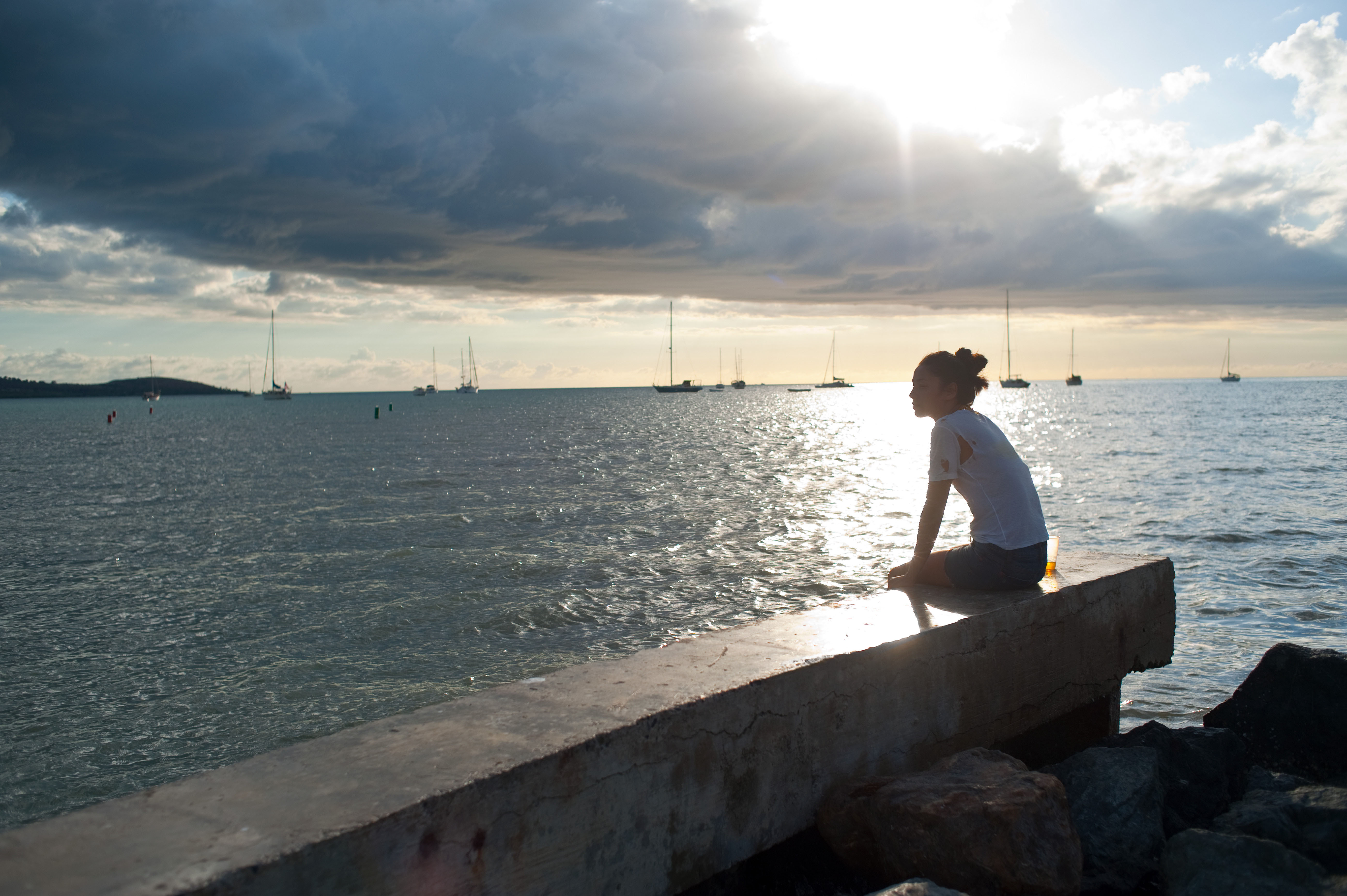Why alone time is the best time
Being alone is not the same as being lonely. Not even close.


A free daily email with the biggest news stories of the day – and the best features from TheWeek.com
You are now subscribed
Your newsletter sign-up was successful
There's a verse in Guns N' Roses' "November Rain" that really speaks to me.
Do you need some time on your ownDo you need some time all aloneEverybody needs some timeOn their ownDon't you know you need some time all alone ["November Rain"]
Yes, I do.
But what is being alone in 2018, when maybe you're not surrounded by friends — not bodily, anyway — but you've got your phone and your computer and your deadlines and to-do lists and your however-many social media followers (not to mention those people who don't follow you, who don't even seem to like you!) hanging onto your every word (or, more likely, waiting to say something cutting to you that you must say something back to and on and on and you're having a conversation with who now anyway, and for what purpose?)?
The Week
Escape your echo chamber. Get the facts behind the news, plus analysis from multiple perspectives.

Sign up for The Week's Free Newsletters
From our morning news briefing to a weekly Good News Newsletter, get the best of The Week delivered directly to your inbox.
From our morning news briefing to a weekly Good News Newsletter, get the best of The Week delivered directly to your inbox.
Even when we're alone in real life, we aren't really alone. It can be exhausting.
I recently got away from all this by spending a week largely alone at a writers' residency at an inn in a rural area trying to finish a manuscript. At night, I'd go to the inn's tiny bar and talk to the bartender, and my voice at first would come out in croaks, and then more fully. It was like I had to relearn how to be around people, so deep in my own head I'd become. Oddly, that didn't scare me; instead, it made me feel great. I wanted to be able to have that feeling again, even if I was in a city of 8 million people — to again feel that singular sense of purpose and focus and self.
Everybody needs some time to be alone, right? Whether it's for your job (it is awfully hard to write when surrounded by people, and the more you like them, the harder it is to write around them), for your mental health, for the restoration of fleeting energies, so you can binge a Netflix series in some peace and quiet, or, as a friend put it, because "I enjoy hearing my own thoughts and I don't have to share my food."
I have people in my life who I love, and yet, sometimes the dreamiest thing I can imagine is all of them going away, not calling, not texting, not knocking on my door or yelling my name or asking me a question or even saying hello, for 24 or 48 hours, a time in which I wouldn't think about anything but how I feel and what I think and what I need to do. (Of course, I'd want them to come back. But the idea of that precious alone time where I could just be me, and probably dressed in a robe and unshowered, is utterly delicious.)
A free daily email with the biggest news stories of the day – and the best features from TheWeek.com
Yet there remains a stigma about being alone, even more so, perhaps, about wanting to be alone. People mistakenly conflate loneliness and aloneness, and quite often we fear being alone because we think it will beget "lonely" — or maybe we're alone because we're lonely, and what's the cure for that?
A lot of people I spoke to for this piece mentioned being "fine with being alone" — not happy, not thrilled, but "fine" — as if the act somehow goes against our natural state, somehow, and maybe it does. Humans are social creatures, after all. Maybe wanting to be alone is selfish, or appears so; after all, you're not taking one for the team, you're taking one for YOU. And I can't help wondering if, as with having children, there's an expectation that women's purpose is to be around others, to want to help and nurture and listen and absorb their energies and make them better, to emotionally labor in their service. (Certainly that appears to be the expectation of certain men on Twitter of women.)
One friend wrote, in response to a question about aloneness pros and cons I put to Facebook: "The best thing about it is having the complete autonomy to make decisions and choose your own path. You don't really have anyone to get in your way or dilute your thinking." It's a valuable reality for writers, and for all of us, really, this idea that you can think truly for yourself because there's no one else around who you have to think for, or who's going to try to think for you, or make you think a certain way. And not simply that you get to have this, but that you should make time for it, yourself, because no one is going to do it for you. That's also the scary part, and perhaps it's why comfort in aloneness has come easier to me as I've gotten older, and also why I crave it more now. It's nervous-making to put your own self first. Who are you, anyway, without the estimations of others? It's scary but it's important to know, and for that, you need to spend some time alone.
"The best thing about being alone is being able to distinguish between expectations others have of me (which are sometimes imagined) and my own needs," another friend told me. "I dread alone time, but once I embrace it I relish it. It's like jumping into a cold pool and then loving it and not wanting to come out."
I remember my best friend telling me, after a particularly painful breakup, "Don't worry, soon enough, you'll be taking up the whole bed as you sleep, and you'll be loving it!" That ideology applies even when you're not ending a relationship. We tell ourselves how much space we can take up in the world when we're around others, and these rules can be restrictive beyond our conscious knowing, especially, I think, for women, who are urged throughout their lives either explicitly or in subtext to be smaller, take up less space, and to exert ourselves in helpfulness to others. Just think about how men and women tend to sit (manspreading vs. woman-inward-pretzeling) and tell me there's not something there. But it's not just a gendered thing. Another friend (who's a man) told me: "I am a very sociable person but like being alone and living alone because the only time I ever feel truly comfortable is when no one can see me."
Who doesn't want to take up whatever space you feel like, however you like, appearing in whatever way you like, free from the judging eyes of others? It's not about being in a relationship or single, it's not even about loneliness, or introversion and extroversion. I imagine even extroverts love the occasional dose of aloneness because it's about the freedom to exist in your own singular reality for a moment — and then, ideally, come back to the pack with all the best stuff about you, truly you, still there. Being alone is good practice for being our best selves out in the world. And this applies online as well. Instead of aligning yourself with this group or that one on Twitter, or waiting for someone else to say what you mean so you can like it, or aping other people's fave-producing tweets, you are required to form your own opinions and ideologies yourself, and for a moment, what other people think doesn't matter.
In a piece for The Atlantic titled "The Virtues of Isolation," Brent Crane wrote of new scientific work regarding the positive aspects of aloneness. "Increasingly scientists are approaching solitude as something that, when pursued by choice, can prove therapeutic," he explained. It turns out that that choice part is very important. "Kenneth Rubin, a developmental psychologist at the University of Maryland, calls them the 'ifs,'" writes Crane. "Solitude can be productive only: if it is voluntary, if one can regulate one's emotions 'effectively,' if one can join a social group when desired, and if one can maintain positive relationships outside of it. When such conditions aren't met, yes, solitude can be harmful."
It's true, I most want to be alone when I know that I can easily have the companionship of others — and perhaps this is part of why it feels so great to cancel plans, or, even better, to find them canceled for you. Or why friends and I have long remarked (half seriously) on how nice it would be if, if you decided to marry someone, you could keep separate apartments. That seems insane but how far off is it, really, particularly in a tiny-apartment city like New York? This is why couples look for and covet such spaces in their own usually quite a bit larger homes, his "man cave" and her "crafting room" (in the most gender-normative HGTV references). We do need our alone time, but there's a special comfort to it when you know that there's someone else there for you, patiently waiting, experiencing whatever reality they need to experience, just beyond the cusp of alone. Or, as another person noted in response to my Facebook question about aloneness, "If you know someone would find your body within 24 hours of your death in your own home, I don't think you are truly alone."
They'd probably find my body in 48 hours, and I'm okay with that.
Jen Doll is the author of the memoir Save the Date: The Occasional Mortifications of a Serial Wedding Guest. She's also the managing editor for Mental Floss magazine and has written for The Atlantic, Esquire, Glamour, Marie Claire, The Hairpin, New York magazine, The New Republic, The New York Times Book Review The Village Voice, and other publications.
-
 The problem with diagnosing profound autism
The problem with diagnosing profound autismThe Explainer Experts are reconsidering the idea of autism as a spectrum, which could impact diagnoses and policy making for the condition
-
 What are the best investments for beginners?
What are the best investments for beginners?The Explainer Stocks and ETFs and bonds, oh my
-
 What to know before filing your own taxes for the first time
What to know before filing your own taxes for the first timethe explainer Tackle this financial milestone with confidence
